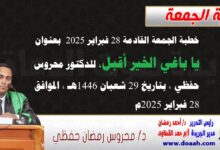Muhammad, the Prophet of Mercy

Allah, the Almighty, sent our Prophet Muhammad (may Allah’s Peace and Blessings be upon him) as a mercy to the worlds. Allah, the Almighty, says, “And We have not sent you, [O Muhammad], except as a mercy to the worlds” (the Qur‘ān, 21: 107). Prophet Muhammad (may Allah’s Peace and Blessings be upon him) introduced himself saying, “O People! Verily, I am a gifted mercy.” The Qur‘ān asserts this meaning declaring, “There has certainly come to you a Messenger from among yourselves. Grievous to him is what you suffer; [he is] concerned over you and to the believers is kind and merciful” (The Qur‘ān, 9: 128).
The Book sent with Prophet Muhammad (may Allah’s Peace and Blessings be upon him) is a Book of Mercy; Allah, the Almighty, says, “And We send down of the Qur‘ān that which is healing and mercy for the believers” (the Qur‘ān, 17: 82). His religion is the religion of mercy, security, safety and peace for all human beings. It is a religion that lays firm foundations of peaceful coexistence among all people in a way that saves the lives of all people and protects the property of all people on pure human bases without discrimination among people on the basis of religion, color, race or ethnicity. All lives are safeguarded; the honor and property of all people are protected; and all trusts are to be rendered to whom they are due without exception. This is our Prophet Muhammad (may Allah’s Peace and Blessings be upon him) entrusting his cousin Ali when he migrated to Medina to return the trusts to those who harmed him, drove him out and stripped many among his Companions of their wealth and property.
On the day when Prophet Muhammad (may Allah’s Peace and Blessings be upon him) went to Ta’if to invite people to Islam, they denied his mission and bestirred their slaves and street boys to throw stones at him until his feet bled. Thereupon, the angel of mountains came to him and said, “O Muhammad, Allah listened to what your people had said to you. I am the angel of the mountains, and Allah has sent me to you so that you may give me your orders. If you wish I will bring together the two mountains that stand opposite to each other at the extremities of Mecca to crush them in between.” To all surprise, Prophet Muhammad (may Allah’s Peace and Blessings be upon him) said, “No, but I would say, O Allah, guide my people for they have no knowledge. I rather hope that Allah will raise from among their descendants people as will worship Allah alone and testify that there is no god except Allah.” When asked to pray against the disbelievers, Prophet Muhammad said “I was not sent as a curser, I was sent as Mercy.”
Islam is the religion of mercy and peace for the whole world. Islam does not sanction killing any person for his beliefs. When Prophet Muhammad (may Allah’s Peace and Blessings be upon him) saw a woman who has been killed in the battlefield, he said: “Who killed her? Female is not the one with whom fighting should have taken place.”
This asserts the fact that disbelievers are not to be killed just for their disbelief and that fighting has been sanctioned to repel aggression, because there is no compulsion in religion. Moreover, rudeness in speech should be shunned as Allah, the Almighty, says to our Prophet Muhammad, “And if you had been rude [in speech] and harsh in heart, they would have disbanded from about you. So pardon them and ask forgiveness for them and consult them in the matter. And when you have decided, then rely upon Allah. Indeed, Allah loves those who rely [upon Him]” (the Qur‘ān, 3: 159).
The Qur‘ān addresses the disbelievers at the tongue of our Prophet Muhammad (may Allah’s Peace and Blessings be upon him) and the tongue of his Companions saying, “And indeed, we or you are either upon guidance or in clear error” (the Qur‘ān, 34: 24). The Qur‘ān does not say, we are upon guidance and you are in clear error even though their misguidance is clear. This is known among the rhetoricians as the style of fairness and this is our culture that treats the other with fairness even in speech.
Islam ordered us to speak to people good words as He says, “And speak to people good [words]” (the Qur‘ān, 2: 83), i.e. to all people. Indeed, we have been ordered to say that which is best, “And tell My servants to say that which is best” (the Qur‘ān, 17: 53) and do that which is best, “And not equal are the good deed and the bad. Repel [evil] by that [deed] which is better; and thereupon the one whom between you and him is enmity [will become] as though he was a devoted friend. But none is granted it except those who are patient, and none is granted it except one having a great portion [of good].” (the Qur‘ān, 41: 34-35). This is our Prophet and these are the manners of our Prophet who said, “I was sent to perfect good character.”
If our religion is the religion of mercy and our Book is the Book of mercy and our Prophet is the Prophet of mercy, then what is the problem with us and what has befallen us? How did some of those who are counted as Muslims reach this degree of harshness? And what is the way out?
There is no doubt that many factors lie behind this phenomenon including the domination of unqualified and unspecialized persons over the Da‘wah discourse and their hijacking of it for long periods and the wrong belief that is common among some of them that going to the extreme bolsters one’s religion. There is a pressing need to correct all these misconceptions while asserting that Islam is the religion of mercy, tolerance and ease. Learned jurists have agreed that jurisprudence implies ease. No jurist ever said that it implies extremism; Allah, the Almighty, says,
- “Allah intends for you ease and does not intend for you hardship” (the Qur‘ān, 2: 185).
- He, the Almighty, also says, “And He has not placed upon you in the religion any difficulty. [It is] the religion of your father, Abraham. Allah named you “Muslims” before [in former scriptures] and in this [revelation] that the Messenger may be a witness over you and you may be witnesses over the people” (the Qur‘ān, 22: 78)
- He, the Almighty, also says, “And know that among you is the Messenger of Allah. If he were to obey you in much of the matter, you would be in difficulty, but Allah has endeared to you the faith and has made it pleasing in your hearts and has made hateful to you disbelief, defiance and disobedience. Those are the [rightly] guided. [It is] as bounty from Allah and favor. And Allah is Knowing and Wise” (the Qur‘ān, 49: 7-8).
- Whenever our Prophet (may Allah’s Peace and Blessings be upon him) was given an option between two things, he used to choose the easier of the two as long as it did not involve any sin or severing ties of kinship. However, if it involved sin or severing ties of kinship, he was the farthest from it.






